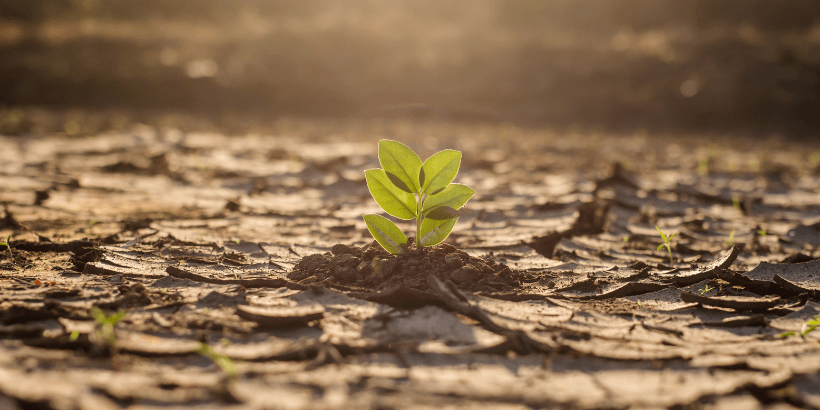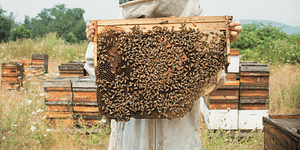A Conversation On Climate Change: Which Path Will We Take?

Dougald Hine has spent most of his life talking to people about climate change. And then one afternoon in the second year of the pandemic, he found he had nothing left to say. Why would someone who cares so deeply about ecological destruction want to stop talking about climate change now?
In the excerpt below, Hine discusses how the COVID-19 pandemic altered the way he thinks about climate change and the potential paths we could be taking next as we enter a new chapter.
The following is an excerpt from At Work in the Ruins by Dougald Hine. It has been adapted for the web.
Talking About Climate Change
I used to think that talking about climate change could be a gateway, the entry point to a larger, deeper conversation. Perhaps that used to be the case. Certainly, in the years before the pandemic, I witnessed a growing number of people having an encounter with climate change not as a problem that could be solved or managed, made to go away or reconciled with some existing arc of progress, but as a dark knowledge that calls our path into question, that starts to burn away the stories we were told and the trajectories our lives were meant to follow, the entitlements we were brought up to believe we had, and our assumptions about the shape of history, the kind of world we were born into and our place within it. For those most sheltered from the shadow side of modernity, the facts of climate change can be the place where its shiny promises first crack; we recognise our vulnerability and it starts to dawn on us that the ship might just be going down.
You could hear this vulnerability in the voices of those at the heart of the climate movements that erupted in 2018 and in the quieter conversations going on within the local groups that formed during that moment. Yet all this talk was still taking place within the vessel of science, and this produced strange contortions and contradictions. The language of science is understated by design. It is hardly suited to speaking in prophetic tones, but this was the signature of these movements. The strangeness of the shift in register applied as much to Greta Thunberg, who was fiercely careful to keep her statements within the bounds of the scientific consensus, as it did to Extinction Rebellion’s Roger Hallam or to Jem Bendell, the Cumbria University professor whose self-published paper ‘Deep Adaptation: A Map for Navigating Climate Tragedy’ – based on his alternative interpretation of the scientific data – went viral that autumn. Whether in alliance with or antagonism to the actual climate scientists, the calls to action were increasingly framed in the name of something called ‘the science’. An understandable shorthand for the consensus over the key processes of climate change built up over decades of research by thousands of teams around the world, this way of talking also had the effect of invoking a singular authority whose implications remained to be seen. ‘Unite Behind the Science’ read the placards and the hashtags, and the more this message was repeated, the stronger the frame of science around our climate conversations became and the less room there would be for looking beyond that frame.
Changing the Context
Two things happened next to change the context of anything that any of us might have to say about climate change. First, in the time of Covid, the political invocation of science took on a new colour. Faced with a novel threat about which there was far less scientific understanding or consensus than climate change, politicians nonetheless discovered the effectiveness of introducing radical policies in the name of ‘following the science’. Meanwhile, the implications of the demand to ‘Unite Behind the Science’ became clearer. I saw the people who had taught me to think carefully about science and the questions that it cannot answer on its own, when they attempted to address the questions raised by the pandemic, being told by angry, frightened readers to ‘Just shut up and take the fucking vaccine!’ Or being scolded by their peers for drifting towards ‘conspiracy theory’. In the name of ‘the science’, it is possible to decree what should be done and to close off the possibility of further public conversation.

Here is what I’m seeing, then: the political contours emerging from the pandemic foreshadow a fork in the road for the politics of climate change. We would always have come to this fork, one way or another. As long as the goal was to have climate change taken seriously, this could unite us, however different our understandings of what taking climate change seriously might mean. As we near that goal, though, the differences in understanding come more sharply into focus. But we have reached that point, or something like it, under conditions in which the authority of ‘the science’ has been supercharged.
Which Path Will We Take?
Two paths lead from here: one big, one small. The big path is a brightly lit highway on which many lanes converge. It unites elements of left and right, from Silicon Valley visionaries and Wall Street investors, through a broad swathe of liberal opinion, to the wilder fringes of Fully Automated Luxury Communism, and in some form it will constitute the political orthodoxy of the 2020s. It sets out to limit the damage of climate change through large-scale efforts of management, control, surveillance and innovation, oriented to sustaining a version of existing trajectories of technological progress, economic growth and development. The small path is a trail that branches off into many paths. It is made by those who seek to build resilience closer to the ground, nurturing capacities and relationships, oriented to a future in which existing trajectories of technological progress, economic growth and development will not be sustained, but where the possibility of a ‘world worth living for’ nonetheless remains. Humble as it looks, as your eyes adjust, you may recognise just how many feet have walked this way and how many continue to do so, even now.
Which of these paths I would have us take is clear enough. The big path is a fast track to nowhere. We will not arrive at the world of fossil-free jumbo jets promised by the airport adverts. The entitlements of late modernity are not compatible with the realities of life on a finite planet and they do not even make us happy. But we may well follow that path for a while longer, as it leads us deeper into dystopia and leaves us more dependent on fragile technological systems that few of us understand or can imagine living without. And what I think I can see now is that the very language of climate change will be owned, from here on out, by the engineers and marketeers of the big path. Any conversation about the trouble we are in, so long as it starts within the newly politicised frame of science, will lead inexorably to their solutions.
If I’m anywhere close to right in this reading of the signs of the times, if the new politics of science emerging from the pandemic does stabilise in something like its current shape, then those of us who are partisans of the small path will find ourselves in a strange position. However far it may be from our political roots, we find that we have more in common with assorted conservatives, dissidents and sceptics – including some whose scepticism extends to climate science – than with the mainstream progressive currents that have so far had a claim to be on the right side of history when it comes to climate change. Under the authority of ‘the science’, talk of climate change will belong to the advocates of the big path and those of us who do not wish to contribute to that future will need to find another place to start from when we want to talk about the depth of the trouble the world is undoubtedly in.
Recommended Reads
A Call to Action on Climate, Farming, Food, and a Green New Deal
Recent Articles
For all the beekeepers and future beekeepers out there, this one is for you! Your journey to successful beekeeping begins with constructing a suitable haven for honeybees, otherwise known as the bee hive. The following is an excerpt from Raising Resilient Bees by Eric and Joy McEwen. It has been adapted for the web. Bees…
Read MoreHave you heard of silvopasture? This system of managing grazing animals is an ancient practice that integrates trees and pasture into a single system for raising livestock. These systems are managed for both forest products and forage, providing short-and long-term income sources in a mutually beneficial way for healthier animals, better soil, less pest control and mowing, and…
Read MoreOxeye daisies are one of the most important plants for pollinators including beetles, ants, and moths that use oxeye daisies as a source of pollen and nectar. Instead of thinking about removing a plant like oxeye daisy, consider how you can improve the fertility and diversity of habitat resources in your home landscape, garden, or…
Read MoreThis long-lived perennial legume is used for forage and erosion control. Kudzu is edible with many medicinal uses and other applications. Pollinators of all kinds love its prodigious lavender blooms!
Read MoreMove aside, maple! We have two new syrups to add to the table. Read on for insights on tapping, selling, and eating syrup from walnut & birch trees.
Read More








